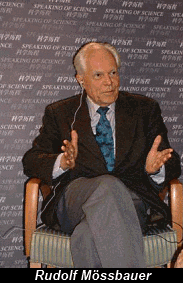|
News & Views item - November 2011 |
![]() The Parable of Rudolf Mössbauer, a Physics
Department and Research Excellence. (November 7, 2011)
The Parable of Rudolf Mössbauer, a Physics
Department and Research Excellence. (November 7, 2011)
 One
of the unfortunate circumstances of many if not most public universities is that
both their administrations and the governments they are beholden to believe they
are the university. A cogent example relates to a
group of top administrators at one of the US' so called
Big Ten
who agreed over coffee one morning in all seriousness that they could run their
university very well if it weren't for the faculty and student body.
One
of the unfortunate circumstances of many if not most public universities is that
both their administrations and the governments they are beholden to believe they
are the university. A cogent example relates to a
group of top administrators at one of the US' so called
Big Ten
who agreed over coffee one morning in all seriousness that they could run their
university very well if it weren't for the faculty and student body.
We are now being told by the Minister for Innovation, Industry, Science and Research, Senator Kim Carr, that Australia's Chief Scientist, Professor Ian Chubb, immediate past vice-chancellor of the Australian National University, is to lead yet a new committee to guide the Australian Government's research investment, ensuring it meets the nation's strategic priorities and delivers long-term prosperity and security. Professor Chubb is already engaged in the Health of Australian Science report, due in 2012, "profiling the strengths and vulnerabilities of Australia's present science capabilities.
"From school kids to Nobel Laureates, from astronomy to agriculture, they want to know how Australia's science future is shaping up".
So what has all of this to do with Rudolf Mössbauer, the 1961 Nobel laureate in physics "for his researches concerning the resonance absorption of gamma radiation and his discovery in this connection of the effect which bears his name"?
The young Mössbauer (1929-2011) was a PhD student at the Max Planck Institute for Medical Research in Heidelberg (1955-58) mentored by Heinz Maier-Leibnitz. It was the discoveries he made there that led to his 1961 Nobel Prize. The year before the award he had moved to the California Institute of Technology (Caltech). but returned to Germany in 1964. Why?
As Fritz Parak puts it in his obituary of Professor Mössbauer:
The Bavarian government was willing to pay a high price for his return — a new physics building and ten professorships. But the gain for physics in Germany was tremendous. Mössbauer's new department brought a blast of fresh air to Munich and enhanced the scientific climate nationwide. Several German scientists who worked in the United States came back to Germany in what was called the 'second Mössbauer effect'.
But of course that was then. This is now and it is most probably too much to ask that Professor Chubb, Senator Carr and all will absorb the lesson.